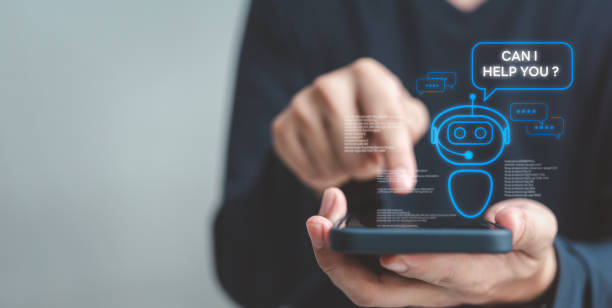The Role of AI Chatbots in Anxiety Therapy
AI chatbots are software programs that use natural language processing (NLP) to interact with users in a conversational manner. For anxiety specialists, chatbots can serve as a first point of contact, provide psychoeducation, and support clients between sessions. Unlike generic chatbots, those designed for mental health are programmed to handle sensitive interactions with empathy and security, making them ideal for engaging clients with anxiety disorders.
Key reasons for adoption include:
- Immediate Support: Clients with anxiety often need quick responses to alleviate distress.
- Accessibility: Chatbots offer 24/7 availability, reducing barriers to care.
- Efficiency: Automating routine tasks frees therapists to focus on clinical work.
- Client Comfort: Text-based interactions may feel less intimidating for anxious clients.
By integrating AI chatbots, anxiety specialists can enhance client engagement while maintaining a professional, supportive practice.
Benefits of AI Chatbots for Anxiety Specialists
AI chatbots offer unique advantages for engaging clients with anxiety, addressing their specific needs and improving therapeutic outcomes.
1. Providing Immediate Support for Anxiety
Anxiety can strike at any time, often outside regular session hours. AI chatbots can:
- Offer calming techniques, such as guided breathing or mindfulness prompts, during moments of distress.
- Answer common questions (e.g., “What are signs of a panic attack?”) with evidence-based information.
- Reduce client overwhelm by providing instant responses, fostering a sense of control.
For example, a chatbot could guide a client through a grounding exercise by asking, “Would you like to try a 5-4-3-2-1 sensory exercise to feel calmer?”
2. Enhancing Accessibility and Convenience
Clients with anxiety may avoid traditional communication due to social fears or logistical barriers. Chatbots improve access by:
- Allowing clients to engage via text or voice from any device, anytime.
- Supporting multilingual interactions for diverse populations.
- Reducing stigma, as clients can seek help privately without scheduling a call.
This aligns with trends in teletherapy platforms for mental health, which prioritize accessibility.
3. Streamlining Client Onboarding
Chatbots can handle initial client interactions, such as:
- Collecting intake information (e.g., symptoms, contact details) via secure forms.
- Guiding clients through scheduling appointments or teletherapy setup.
- Sending reminders to complete forms or attend sessions, reducing no-shows.
This automation integrates with HIPAA-compliant patient portals, enhancing efficiency.
4. Supporting Between-Session Engagement
Maintaining client progress between sessions is critical for anxiety treatment. Chatbots can:
- Deliver daily affirmations or coping strategies (e.g., “Try journaling one thing you’re grateful for today”).
- Track mood or anxiety levels through simple check-ins, sharing data with therapists (with consent).
- Provide psychoeducation on topics like cognitive behavioral therapy (CBT), reinforcing session lessons.
For more on tracking progress, see digital tools for client progress tracking.
5. Reducing Therapist Burnout
By automating repetitive tasks, chatbots allow anxiety specialists to focus on clinical care:
- Answer FAQs (e.g., “What is exposure therapy?”) without therapist intervention.
- Handle appointment scheduling and cancellations.
- Manage inquiries about insurance or billing, reducing administrative burden.
This efficiency supports AI-powered appointment scheduling.
6. Building Client Trust and Engagement
Clients with anxiety often prefer low-pressure interactions. Chatbots can:
- Use empathetic, programmed responses to mirror therapeutic tone (e.g., “I’m here to help. What’s on your mind?”).
- Offer anonymous initial interactions to ease clients into therapy.
- Personalize responses based on client history, enhancing rapport.
Key Features of HIPAA-Compliant AI Chatbots
To ensure safety and compliance, anxiety specialists must choose chatbots with specific features tailored for mental health settings.
1. HIPAA Compliance
HIPAA compliance is non-negotiable for handling PHI. Chatbots must:
- Use 256-bit AES encryption for all interactions and data storage.
- Offer a Business Associate Agreement (BAA) from the vendor.
- Implement access controls to restrict PHI to authorized users.
2. Natural Language Processing (NLP)
Advanced NLP enables chatbots to understand and respond to conversational queries:
- Interpret varied phrasing (e.g., “I’m feeling anxious” or “I’m freaking out”).
- Support voice and text inputs for accessibility.
- Provide contextually relevant responses, such as CBT-based suggestions.
3. Secure Data Handling
Chatbots must protect client data:
- Encrypt all messages and stored data.
- Use secure cloud storage with regular backups.
- Delete temporary data (e.g., session logs) per HIPAA retention guidelines.
4. Customizable Responses
Anxiety specialists need chatbots that align with their therapeutic approach:
- Program responses to reflect CBT, mindfulness, or other modalities.
- Customize prompts for specific anxiety disorders (e.g., social anxiety, GAD).
- Tailor tone to be empathetic and non-clinical for client comfort.
5. Integration with EHR and Teletherapy
Seamless integration enhances functionality:
- Sync with EHR systems like SimplePractice or TherapyNotes to store client data.
- Connect with teletherapy platforms for scheduling or session links.
- Share mood tracking or check-in data with therapists securely.
For more on EHR integration, see EHR solutions for mental health.
6. Analytics and Reporting
Chatbots can provide insights to improve engagement:
- Track interaction frequency and common queries.
- Monitor client mood trends (with consent) to inform therapy.
- Generate reports for therapists to review between-session progress.
Top HIPAA-Compliant AI Chatbot Platforms for 2025
Several platforms offer HIPAA-compliant chatbots suitable for anxiety specialists:
1. Woebot Health
Woebot is an AI chatbot designed for mental health support, with a focus on anxiety and depression.
- Features:
- HIPAA-compliant with a BAA.
- CBT-based interventions and mood tracking.
- 256-bit encryption and secure data storage.
- Integrates with EHR systems.
- Best For: Solo practitioners seeking client-focused tools.
2. SimplePractice (Client Portal Chat)
SimplePractice offers a HIPAA-compliant chatbot within its client portal for scheduling and inquiries.
- Features:
- Encrypted messaging and 2FA.
- BAA included.
- Customizable responses for intake or FAQs.
- Seamless EHR and teletherapy integration.
- Best For: Practices needing an all-in-one solution.
3. TheraNest (Client Portal)
TheraNest’s portal includes chatbot features for client engagement.
- Features:
- HIPAA-compliant with secure messaging.
- BAA and audit logging.
- Appointment scheduling and reminders.
- Scalable for group practices.
- Best For: Multi-therapist practices.
4. Youper
Youper is a mental health chatbot with AI-driven anxiety support.
- Features:
- HIPAA-compliant with encryption.
- Mood tracking and personalized CBT exercises.
- Integrates with teletherapy platforms.
- Voice and text support.
- Best For: Therapists focusing on tech-savvy clients.
5. Chatbot Custom Solutions (e.g., Tars, ManyChat with HIPAA Add-Ons)
Custom chatbot platforms can be configured for HIPAA compliance.
- Features:
- Customizable workflows for anxiety-specific prompts.
- HIPAA-compliant with third-party encryption add-ons.
- Integration with scheduling or EHR tools.
- Scalable for unique practice needs.
- Best For: Practices with specific requirements.
Challenges and Solutions for Using AI Chatbots
While AI chatbots offer significant benefits, challenges may arise:
- Client Privacy Concerns: Clients may worry about data security.
- Solution: Use HIPAA-compliant platforms and transparently communicate security measures.
- Solution: Use HIPAA-compliant platforms and transparently communicate security measures.
- Limited Emotional Depth: Chatbots cannot replace human therapists.
- Solution: Position chatbots as supplementary tools for between-session support.
- Solution: Position chatbots as supplementary tools for between-session support.
- Technical Complexity: Setting up chatbots may require expertise.
- Solution: Choose user-friendly platforms or hire specialists, as discussed in custom app development for therapists.
- Solution: Choose user-friendly platforms or hire specialists, as discussed in custom app development for therapists.
- Client Resistance: Some clients may prefer human interaction.
- Solution: Offer chatbots as an optional tool and educate clients on benefits.
Best Practices for Implementing AI Chatbots
To maximize the effectiveness of AI chatbots, anxiety specialists should follow these best practices:
- Choose a HIPAA-Compliant Platform:
- Verify the vendor’s BAA and encryption standards.
- Avoid non-compliant platforms like standard messaging apps.
- Customize for Anxiety Clients:
- Program responses to address common anxiety triggers (e.g., social situations, panic attacks).
- Use empathetic, non-clinical language to build trust.
- Integrate with Existing Tools:
- Sync with EHRs or teletherapy platforms for seamless workflows.
- Use secure forms for intake, as outlined in HIPAA-compliant contact forms.
- Educate Clients:
- Provide guides on using the chatbot securely.
- Explain how it complements therapy, not replaces it.
- Monitor and Update:
- Review chatbot analytics to identify engagement patterns.
- Update responses to reflect new research or client needs.
- Ensure Ethical Use:
- Obtain client consent for data collection (e.g., mood tracking).
- Follow ethical AI guidelines, as discussed in ethical AI use in mental health.
The Future of AI Chatbots in Anxiety Therapy
In 2025, AI chatbots are evolving to enhance client engagement:
- Advanced NLP: Improved understanding of complex emotional queries.
- Personalization: AI will tailor responses based on client history or preferences.
- Voice Integration: Voice-enabled chatbots will align with voice search optimization, improving accessibility.
- Predictive Analytics: Chatbots may predict anxiety triggers using data patterns, as explored in predictive analytics for mental health.
By adopting these advancements, anxiety specialists can stay at the forefront of client-centered care.
Conclusion
AI chatbots are transformative tools for anxiety specialists, offering immediate support, improving accessibility, and streamlining practice operations. By choosing HIPAA-compliant platforms like Woebot or SimplePractice, therapists can engage clients effectively while protecting privacy. Implementing best practices—such as customization, integration, and client education—ensures chatbots enhance therapeutic outcomes.
For expert support in deploying AI chatbots and other digital tools, visit Mental Health IT Solutions, which specializes in secure, tailored solutions for therapy practices.







